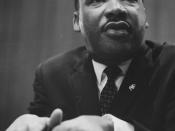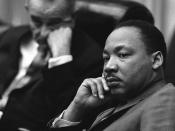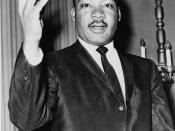In 1966 Martin Luther King decided to focus on dealing with the problems in the North particularly Chicago. The problems that he encountered here were very different to those that he had had so much success with in the South. Dealing with the economic and social segregation that he faced here proved difficult for several reasons.
The problems facing blacks in the North, stemmed from a variety of different areas including education, employment, housing etc. Although King was able to identify the problems being faced in these areas, particularly housing, he still largely relayed on the same tactics that he and the Southern Christian Leadership Conference (SCLC) had used in the South. However, the mayor of Chicago (Daley) would avoid making a hostile response such as that of 'Bull' Connor in Birmingham. The authorities here were more subtle to avoid gaining the attention of the media e.g. the police would avoid using brutality and Daley even blamed violence for social decay*.
This prevented the movement from gaining as much publicity and support as in previous years. King also tried to come to some sort of agreement with Daley regarding housing. However, Daley was reluctant to do so fearing the loss of votes of the white working class. Actions such as this added to the anger that blacks in Chicago felt towards the white authorities and increased their unwillingness to co-operate. Both Mayor Daley's refusal to help and King's disorganisation when planning the Chicago campaign played an important role in its failure.
Chicago suffered more from problems in racial division than other cities in the North, and so perhaps it was not a good starting point for the campaign here. Locals would sometimes blame blacks for inciting race riots and these divisions were illustrated by the marches organised by the...


